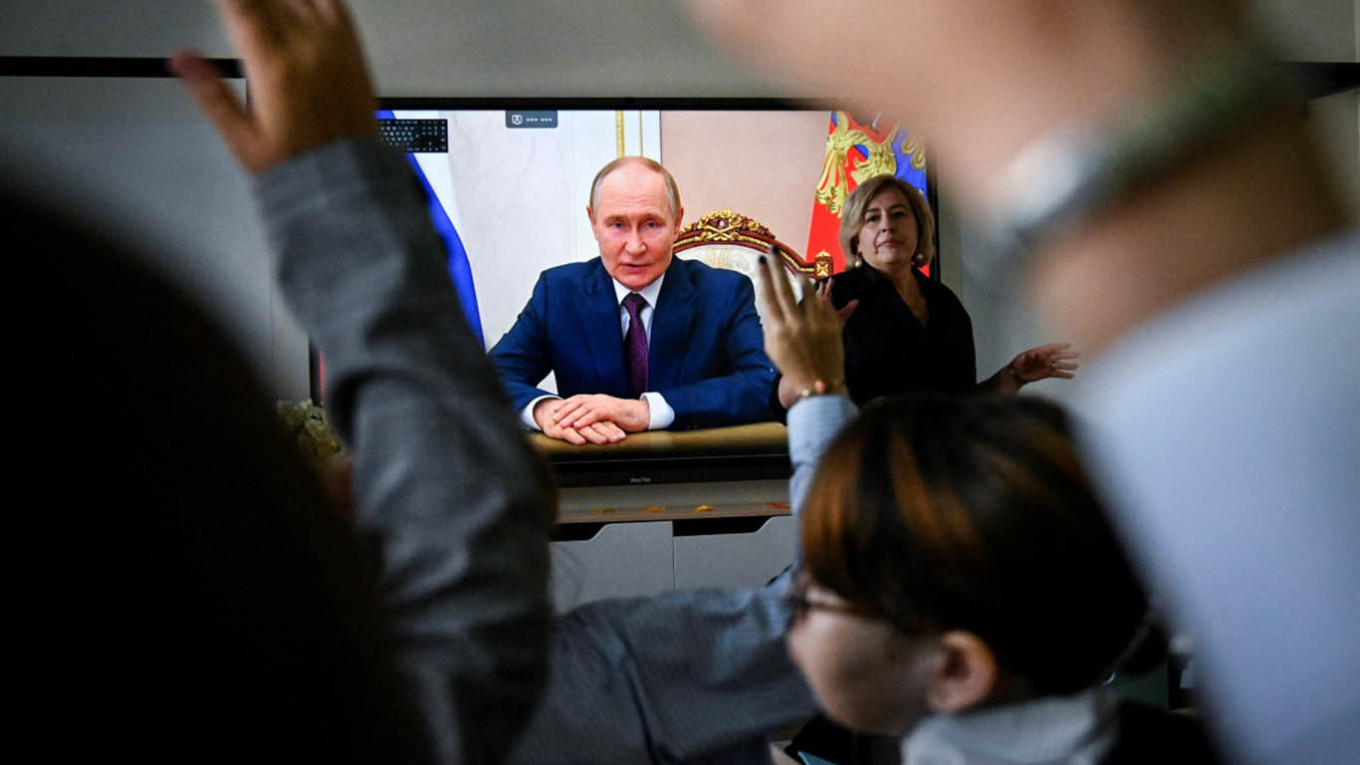On Monday, schoolchildren and university students throughout Russia celebrated the beginning of the new academic year in an event referred to as Knowledge Day.
Under President Vladimir Putin, the Kremlin has sought to shape educational curricula in schools and universities to align with its political agenda, gradually converting these institutions into arenas of ideological influence.
This trend has intensified since the onset of the conflict in Ukraine, with regular patriotic lessons, new history textbooks that propagate the Kremlin’s viewpoint, and increased funding for militarized programs aimed at youth.
This academic year, students in Russia will again see their educational environments affected by war, assuming they are able to access a school system that has increasingly become exclusive to various communities.
Beginning this school year, migrant children will not be allowed to attend school unless they successfully pass a Russian language proficiency exam and can provide proof of residency.
The new legislation, which took effect in April, has drawn severe criticism from human rights advocates, who warn that it will socially alienate migrant children and create an environment conducive to their radicalization and potential criminal behavior.
Olga Abramenko from the Memorial Anti-Discrimination Center indicated to Novaya Gazeta Europe that while many nations do require assessments for migrant children, “the intention is not to exclude children unworthy of education.”
“In other countries, the aim is to chart their educational paths and establish integration classes with intensive language training… Nowhere else in the world is there a practice of segregation like that currently found in Russia,” Abramenko stated.
According to data from the business daily RBC, 81% of the 1,800 foreign children who sought admission to Russian schools this year were prevented from taking the mandatory language proficiency exam due to errors in their applications or missing documents.
While national statistics on the number of migrant children who began school on September 1 are not yet available, regional data presented by State Duma Speaker Vyacheslav Volodin indicates that a majority of those registered for the language test did not pass.
In the northern republic of Komi, only three out of 14 test candidates passed, and in the Sverdlovsk region, just 13 out of 66 passed, as per Volodin’s report.
Volodin mentioned that “one in ten children without Russian citizenship did not succeed on the test” in Tatarstan, prompting the republic’s leader, Rustam Minnikhanov, to openly critique the new admission policies.
“How can you deny a child access to education? Where should they be?… Any child can learn the language within three or four months. There’s nothing to be anxious about,” Minnikhanov stated during a public meeting with educators in August, instructing the region’s education ministry to provide free Russian language classes for migrant kids.
“We rely on migrants for our workforce… Most of them are law-abiding, employable citizens,” he added.
At the same time, certain migrant students will face increased monitoring by school officials tasked with identifying “tendencies toward illegal behavior” among these children, as outlined by new directives from the Education Ministry.
Starting September 1, the amount of time dedicated to studying Indigenous languages and literature in first-grade classrooms across all Russian schools will be reduced to only one hour per week.
More than 30 languages native to Russia have official status in its 21 ethnic republics. In theory, this allows these Indigenous languages to be utilized in legislation, court procedures, and school instruction.
In practice, however, their use is increasingly confined to the home, especially since the Kremlin imposed a ban on mandatory instruction of these languages in ethnic republics in 2017.
Teachers, activists, and even top officials in Tatarstan, Sakha (Yakutia), Altai, and Mari El openly condemned the decision to lessen language instruction hours when it was announced in July.
“A single hour of language instruction cannot produce any significant results,” a former Tatar language teacher from Kazan remarked to The Moscow Times.
“Even motivated adults studying languages with private tutors for two hours a week often find that to be insufficient. So, what can be expected from one teacher instructing a class of 30 largely unmotivated students for just one hour each week?” the teacher, who preferred to remain unnamed for safety reasons, said.
Commenting on the decision to maintain any form of language instruction as merely a “symbolic gesture,” the educator pointed out that even the previously allotted two to three hours per week for Indigenous language studies was inadequate for ensuring their survival against the dominance of the Russian language.
“The decision to reduce instruction hours in first grade is just the beginning. I anticipate this measure will soon extend to middle and high schools,” the teacher warned. “This is a disaster.”
At least 100 preschools across Russia and in occupied regions of Ukraine began the new academic year on September 1 with the introduction of “Important Conversations,” a pilot initiative for children aged 3 to 7 aimed at expanding a program backed by Putin.
First launched in primary and secondary schools following the large-scale invasion of Ukraine, these “Important Conversations” for young children will focus on fostering “respect for Russian culture and history, love for the Motherland,” and instilling family values, according to the Education Ministry.
The ministry also released a list of 37 “patriotic” songs recommended for inclusion in school music lessons, featuring Soviet classics like David Tukhmanov’s “Victory Day” alongside contemporary tracks from pro-war pop artists.
Teachers and parents are being encouraged to move all communications to Max, a domestic application anticipated to become Russia’s national messaging platform similar to China’s WeChat.
Educators and parents from various regions across Russia confirmed this transition to The Moscow Times.
Though still in its initial testing phase, Max has gained notoriety for its significant lack of privacy, as its developer VK shares data with security agencies.
Since 2023, universities have implemented admission quotas for veterans of the Ukraine conflict and security personnel stationed in occupied areas of Ukraine, along with their children, with the number of enrollments through these quotas increasing each year.
This year, nearly 3,000 veterans of the Ukraine war and their children enrolled in Russia’s top 18 universities, representing a 58% increase from the previous year, according to research from the exiled investigative organization IStories.
An analysis of enrollment data by IStories indicates that over 70% of students admitted via quotas would not have qualified for admission if competing on equal terms with other candidates.
The Kremlin plans to extend this program to include the wives and widows of Ukraine war veterans beginning in 2026.
“Universities remain sanctuaries for abstract thinkers and quiet dissenters. The admission of wives and widows of veterans under special conditions will alter the demographics of these institutions to favor the Kremlin,” scholar Yan Levchenko wrote in a recent op-ed for The Moscow Times.
Meanwhile, the overall number of government-subsidized slots available at all Russian universities has decreased by 2,000 compared to last year, and tuition fees continue to rise, making higher education increasingly out of reach for the average Russian teenager.
Veterans of the Ukraine war are also becoming more prevalent among teaching staff in Russian schools.
Since the full-scale invasion in February 2022, soldiers who served in Ukraine have led as many as 40,000 patriotic lessons, and at least 100 demobilized soldiers are currently working as teachers, according to an investigation by Novaya Gazeta Europe.
In at least four documented instances, veterans have been appointed as school principals, as reported in the media.
Most recently, Ukraine war veteran Vladimir Sterekhov was appointed as the head of a school in Yekaterinburg, Russia’s fourth-largest city.
“My role is to nurture a unique environment where everyone can thrive, acquire new knowledge, and reach their full potential. We aim to create a school of the future: modern, creative, and open to new ideas and technologies,” Sterekhov was quoted as saying by news outlets.

